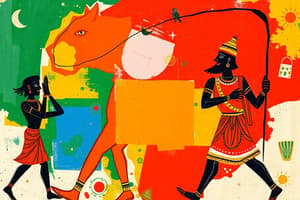Podcast
Questions and Answers
Where was the Indus Valley Civilization located?
Where was the Indus Valley Civilization located?
- Present-day Bangladesh and Sri Lanka
- Present-day Pakistan and northwestern India (correct)
- Present-day Afghanistan and Iran
- Present-day China and Japan
What was a key feature of the Indus Valley Civilization?
What was a key feature of the Indus Valley Civilization?
- Development of Hinduism and the Vedas
- Promotion of Buddhism
- Advancements in mathematics and astronomy
- Sophisticated irrigation systems (correct)
Which two major cities were part of the Indus Valley Civilization?
Which two major cities were part of the Indus Valley Civilization?
- Vakataka and Gupta
- Kuru and Panchala
- Satavahana and Pallava
- Mohenjo-Daro and Harappa (correct)
What led to the decline of the Indus Valley Civilization?
What led to the decline of the Indus Valley Civilization?
What was a key feature of the Vedic Period?
What was a key feature of the Vedic Period?
Who founded the Mauryan Empire?
Who founded the Mauryan Empire?
What was a key feature of the Mauryan Empire?
What was a key feature of the Mauryan Empire?
Who ruled much of central India during the ancient period?
Who ruled much of central India during the ancient period?
What was the social system of ancient India?
What was the social system of ancient India?
What was a key feature of the Gupta Empire?
What was a key feature of the Gupta Empire?
Flashcards are hidden until you start studying
Study Notes
Indus Valley Civilization (3300-1300 BCE)
- Located in present-day Pakistan and northwestern India
- Key features:
- Advanced urban planning and architecture
- Sophisticated irrigation systems
- Trade networks with Mesopotamia and Egypt
- Writing system not yet deciphered
- Major cities: Mohenjo-Daro and Harappa
- Decline due to climate change, drought, and invasion by Indo-Aryan people
Vedic Period (1500-500 BCE)
- Indo-Aryan people migrated to India from Central Asia
- Key features:
- Development of Hinduism and the Vedas ( ancient Hindu scriptures)
- Caste system emerged
- Early Sanskrit language and literature
- Major kingdoms: Kuru and Panchala
- Upanishads (800-400 BCE): philosophical texts exploring the nature of reality
Mauryan Empire (322-185 BCE)
- Founded by Chandragupta Maurya
- Key features:
- Unified most of the Indian subcontinent
- Administration and bureaucracy
- Promotion of Buddhism
- Ashoka the Great (269-232 BCE): converted to Buddhism, spread teachings throughout Asia
- Decline due to internal conflicts and invasion by foreign powers
Gupta Empire (320-550 CE)
- Founded by Chandragupta I
- Key features:
- Golden Age of ancient India
- Advancements in mathematics, astronomy, and medicine
- Development of Hindu and Buddhist art and architecture
- Decline due to Hun invasions and internal conflicts
Other Ancient Indian Kingdoms
- Satavahana Empire (230 BCE-220 CE): ruled much of central India
- Pallava Empire (275-897 CE): ruled southern India
- Vakataka Empire (250-500 CE): ruled central India
Ancient Indian Society and Culture
- Caste system: four varnas (social classes) and numerous jatis (sub-castes)
- Family and kinship: patriarchal society, joint families common
- Economy: agriculture, trade, and commerce
- Art and architecture: development of Hindu, Buddhist, and Jain art and architecture
- Science and philosophy: contributions to mathematics, astronomy, and philosophy
Indus Valley Civilization (3300-1300 BCE)
- Located in present-day Pakistan and northwestern India
- Featured advanced urban planning and architecture
- Had sophisticated irrigation systems
- Maintained trade networks with Mesopotamia and Egypt
- Developed a writing system that remains undeciphered
- Major cities included Mohenjo-Daro and Harappa
- Declined due to climate change, drought, and invasion by Indo-Aryan people
Vedic Period (1500-500 BCE)
- Saw the migration of Indo-Aryan people from Central Asia to India
- Marked the development of Hinduism and the Vedas
- Witnessed the emergence of the caste system
- Saw the early development of the Sanskrit language and literature
- Featured prominent kingdoms such as Kuru and Panchala
- Upanishads (800-400 BCE) explored the nature of reality
Mauryan Empire (322-185 BCE)
- Was founded by Chandragupta Maurya
- Unified most of the Indian subcontinent
- Developed a system of administration and bureaucracy
- Promoted Buddhism
- Saw the reign of Ashoka the Great (269-232 BCE), who converted to Buddhism and spread its teachings throughout Asia
- Declined due to internal conflicts and foreign invasions
Gupta Empire (320-550 CE)
- Was founded by Chandragupta I
- Marked the Golden Age of ancient India
- Saw advancements in mathematics, astronomy, and medicine
- Featured the development of Hindu and Buddhist art and architecture
- Declined due to Hun invasions and internal conflicts
Other Ancient Indian Kingdoms
- Satavahana Empire (230 BCE-220 CE) ruled much of central India
- Pallava Empire (275-897 CE) ruled southern India
- Vakataka Empire (250-500 CE) ruled central India
Ancient Indian Society and Culture
- Featured a rigid caste system with four varnas and numerous jatis
- Was a patriarchal society with joint families being common
- Had an economy based on agriculture, trade, and commerce
- Saw the development of Hindu, Buddhist, and Jain art and architecture
- Made significant contributions to mathematics, astronomy, and philosophy
Studying That Suits You
Use AI to generate personalized quizzes and flashcards to suit your learning preferences.




